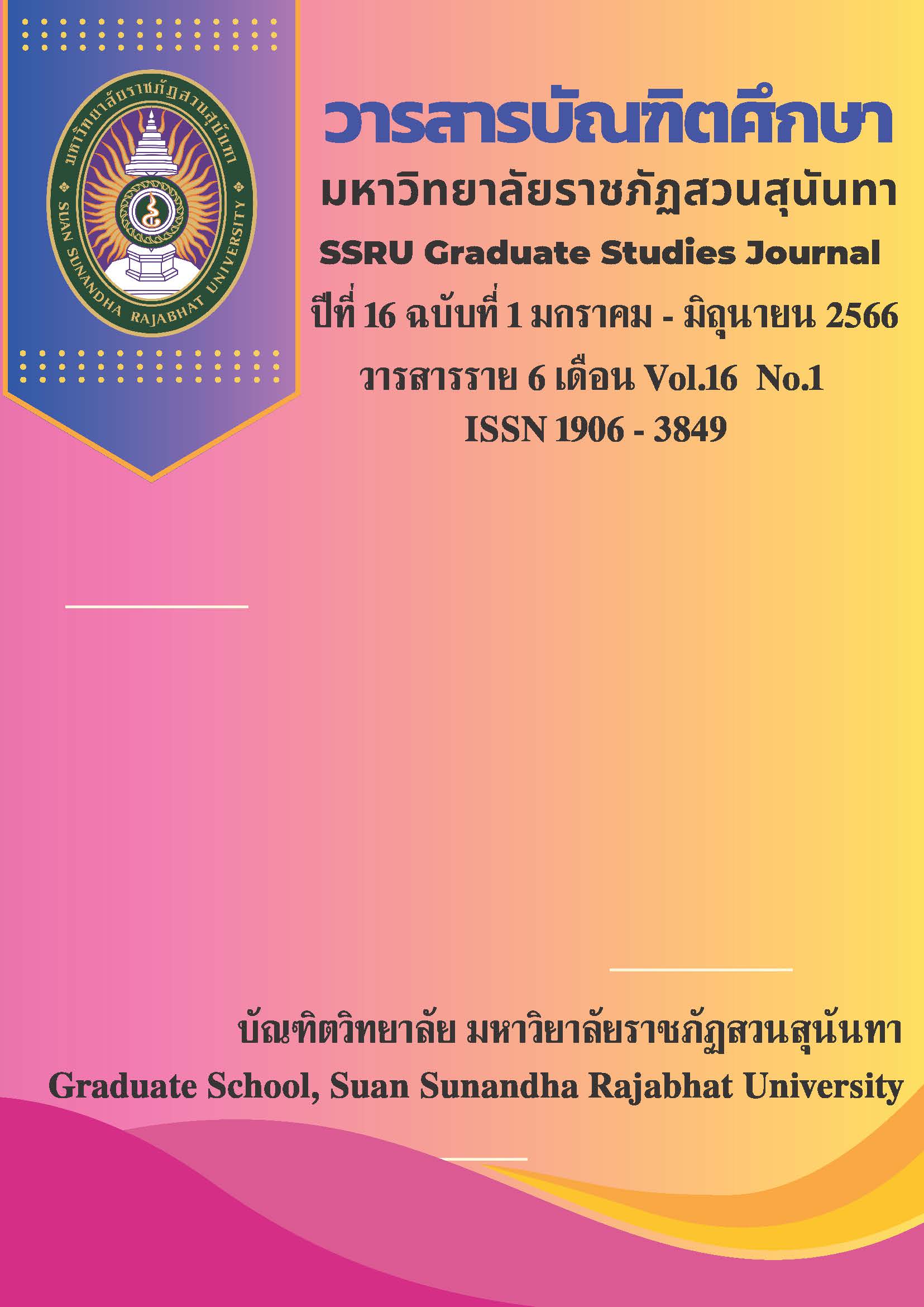Guideline for Tourism Development for Solo Travelers in Thailand
Main Article Content
Abstract
The main aim of this study was to investigate the behaviors, expectations, and satisfaction levels of solo travelers in Thailand. The objective was to create a comprehensive guideline for the advancement of tourism specifically tailored to this group of travelers. The research involved gathering data from 400 solo travelers, comprising both Thai and foreign individuals. A questionnaire was utilized as the primary data collection instrument, and the gathered information was analyzed using various descriptive statistical measures such as percentages, frequencies, means, and standard deviations. In addition, inferential statistical methods including t-tests, ANOVA, and Pearson's correlation coefficient were employed to test hypotheses. The findings of the study indicated that a significant portion of solo travelers chose to stay in Thailand for durations ranging from one to five days, with a budget ranging from 20,001 to 30,001 baht (637 - 956 USD). These travelers primarily obtained their information through online social media platforms and held the highest expectations for tourist attractions, services, safety and security, as well as facilities. Moreover, the respondents reported the highest levels of satisfaction with tourist attractions and services. The results from hypothesis testing revealed that satisfaction levels varied among solo travelers based on their duration of stay and their inclination to visit Thailand. Furthermore, the study identified a statistically significant relationship between tourists' expectations and their satisfaction.
Article Details
References
กระทรวงการท่องเที่ยวและกีฬา. (2558). ยุทธศาสตร์การท่องเที่ยวไทย พ.ศ. 2558 - 2560. สืบค้นจาก http://www.mots.go.th/ewt_dl_link.php?nid=7114.
เกียรติสุดา ศรีสุข. (2552). ระเบียบวิธีวิจัย. (พิมพ์ครั้งที่ 3). เชียงใหม่ : ครองช่างพริ้นติ้ง.
จีราวัฒน์ คงแก้ว. (2559). Solo Travelers ปฏิวัติท่องเที่ยวยุคโซเชียล. กรุงเทพธุรกิจ. สืบค้นจาก https://www.bangkokbiznews.com/business/683856.
ธันยชนก ใจแสน, เบญญาภา สนิทมัจโร และนุชนารถ รัตนสุวงศ์ชัย.(2560). พฤติกรรมการท่องเที่ยวของนักท่องเที่ยวชาวตะวันตกที่เที่ยวคนเดียวในเขตกรุงเทพมหานคร.การประชุมวิชาการระดับชาติ ครั้งที่ 14 มหาวิทยาลัยเกษตรศาสตร์ วิทยาเขตกําแพงแสน วันที่ 7-8 ธันวาคม 2560.
ปริชล วิมลเมือง. (2560). แนวทางการพัฒนาโฮสเทล เพื่อรองรับนักท่องเที่ยวกลุ่ม Solo Travel ในอำเภอเมือง จังหวัดภูเก็ต. วิทยานิพนธ์ศิลปศาสตรมหาบัณฑิต สาขาการจัดการการท่องเที่ยวแบบบูรณาการ, สถาบันบัณฑิตพัฒนาบริหารศาสตร์.
พรรณ์ธิดา เหล่าพวงศักดิ์. (2559). แนวทางการพัฒนาการท่องเที่ยวเชิงศาสนาเพื่อรองรับนักท่องเที่ยวกลุ่มประชาคมเกษียณ จังหวัดกาญจนบุรี. มหาวิทยาลัยเอเชียอาคเนย์. วารสารวิชาการมหาวิทยาลัยธนบุรี 10 (21) เดือนมกราคม – เมษายน 2559.
พสุ เดชะรินทร์. (2564).หลังยุคโควิด พฤติกรรมการท่องเที่ยวจะเปลี่ยนไปอย่างไร.สืบค้นจาก https://www.bangkokbiznews.com/columnist/969343.
ภูชิษา ปันแก้ว. (2557). ความคาดหวังและความพึงพอใจของนักท่องเที่ยวชาวไทยที่มีต่อการท่องเที่ยวเชิงวัฒนธรรมโดยใช้รถรางที่จัดโดยเทศบาลเมือง จังหวัดน่าน. วารสารวิชาการสถาบันวิทยาการจัดการแห่งแปซิฟิค 4(1), 123-131.
สายยศ และอังคณา สายยศ. (2553). เทคนิคการวิจัยทางการศึกษา. พิมพ์ครั้งที่11. กรุงเทพฯ : สุวีริยาสาส์น.
วนิดา อ่อนละมัย. (2565). แนวทางการพัฒนาการท่องเที่ยวอย่างมีความรับผิดชอบชุมชน บ้านศรีฐาน จังหวัดขอนแก่น.วารสารบริหารธุรกิจและสังคมศาสตร์ มหาวิทยาลัยรามคําแหง 5(2) พฤษภาคม – สิงหาคม 2565.
วรัญญู แก้วกัลยา. (2560). แนวทางการพัฒนาและส่งเสริมการท่องเที่ยวเชิงวัฒนธรรมของนักท่องเที่ยวชาวต่างชาติในเกาะรัตนโกสินทร์ กรุงเทพมหานคร. วารสารบัณฑิตวิทยาลัยสวนดุสิต 13(2), 201-215.
วิวัฒน์ชัย บุญยภักดิ์. (2554). การท่องเที่ยวและการจัดการอุตสาหกรรมการท่องเที่ยวกรุงเทพฯ: โอเดียนสโตร์.
วิเชียร เกตุสิงห์. (2550). หลักการสร้างและวิเคราะห์เครื่องมือที่ใช้ในการวิจัย. กรุงเทพฯ : ไทยวัฒนาพานิช.
ศุภากร สุรดินทร์กูร. (2563). การพัฒนาการจัดการการท่องเที่ยวเชิงวัฒนธรรมในเขตกรุงเทพมหานคร. วารสารสถาบันวัฒนธรรมและศิลปะ 22(1), 100 – 115.
ศุภาวรรณ วงศ์ชูทรัพย์. (2562). เทรนมาแรง! “Solo travel” เที่ยวคนเดียว เที่ยวด้วยตัวเอง. สืบค้นจาก https://shorturl.asia/XRhrK.
ศิริวรรณ เสรีรัตน์ และคณะ. (2552). การบริหารการตลาดยุคใหม่ (Marketing management) ฉบับปรับปรุงใหม่ ปี 2552. กรุงเทพฯ : ธรรมสาร.
Gray Cargill. (2009). What is solo travel?. Retrieved from https://solofriendly.com/whatis-solo-travel/
Janice. (2011). Solo Travel Means. Retrieved from https://solotravelerworld.com/solotravel-means/
Millet. (1954). Management in the Public Service. The quest for effective performance. New York: McGraw-Hill Book.
Suwicha Pitakkanchanakul. (2562). Solo Travel ไปเที่ยวคนเดียวแต่เพื่อนเยอะกว่า. สืบค้นจาก https://thematter.co/brandedcontent/crp-solo-travel-01/66408.
W.G. Cochran. (1953). Sampling Techiques. New York: John Wiley & Sons.


